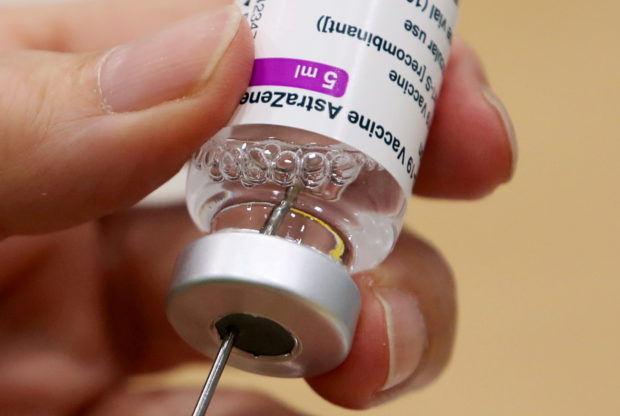AstraZeneca second dose doesn’t raise risk of rare blood clots–study

A medical worker prepares a dose of Oxford/AstraZeneca’s COVID-19 vaccine at a vaccination centre in Antwerp, Belgium March 18, 2021. REUTERS FILE PHOTO
AstraZeneca’s COVID-19 shot did not increase the instances of rare blood clots with low platelets in people after the second dose, a study showed on Wednesday, potentially easing some worries over the vaccine’s side-effects.
Data published in the Lancet medical journal found that the estimated rate of thrombosis with thrombocytopenia syndrome (TTS) after the second dose of the vaccine was 2.3 per million in those inoculated, comparable to the typical rate seen in those who have not been vaccinated, AstraZeneca said.
That rate was 8.1 after the first dose, it added.
The research, led and funded by AstraZeneca, evaluated reported cases occurring within 14 days of administration of the first or second dose as of April 30, using the Anglo-Swedish drugmaker’s global safety database.
“Unless TTS was identified after the first dose, these results support the administration of the two-dose schedule of Vaxzevria, as indicated, to help provide protection against COVID-19 including against rising variants of concern,” said AstraZeneca senior executive Mene Pangalos.
AstraZeneca’s shot, invented by Oxford University, has fallen behind in the vaccine race after several blows, including production delays, a lawsuit and possible links to some rare, but severe side-effects, including TTS, that are being probed by regulators.
The EU drug regulator has been looking into cases of TTS since March and has found a possible link to Vaxzevria, and to Johnson & Johnson’s single-dose shot. It has, however, maintained that overall benefits of both the vaccines outweigh any risks posed by them.
A total of 316 cases of TTS were recorded in adults who received AstraZeneca’s COVID-19 vaccine in the European Economic Area, authorities had said on May 28.














